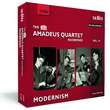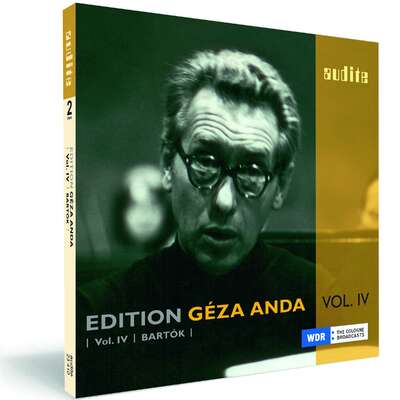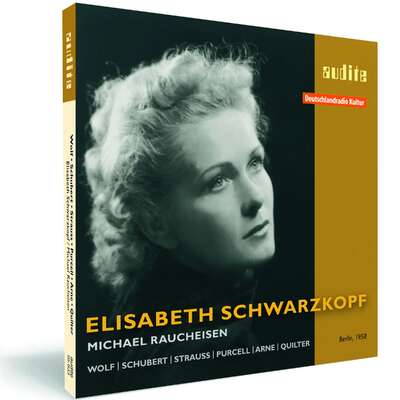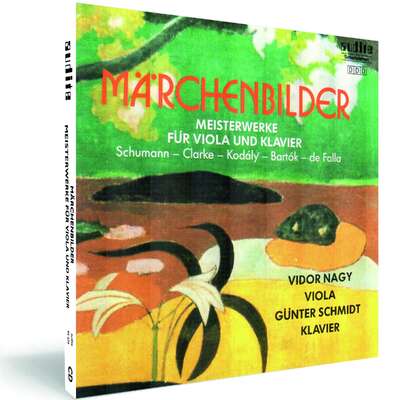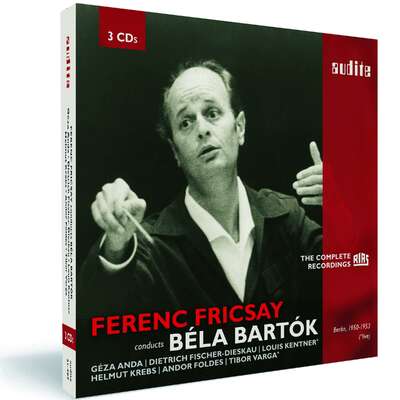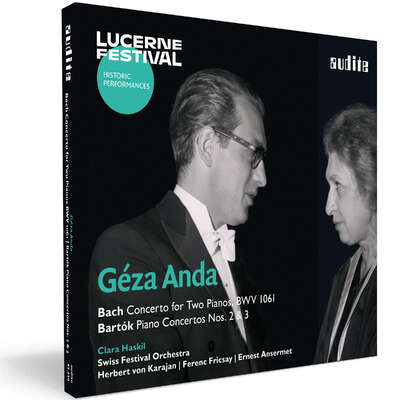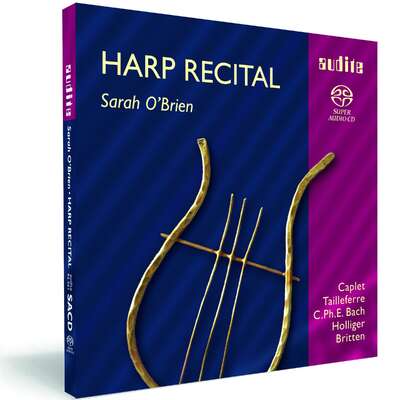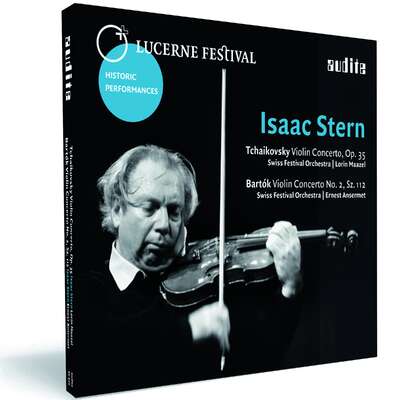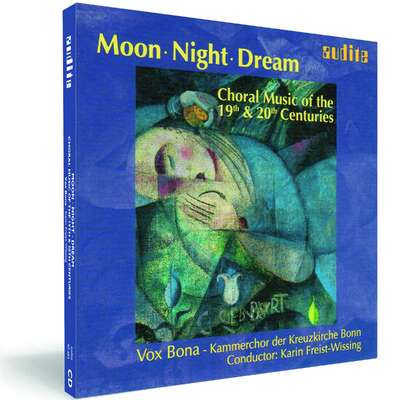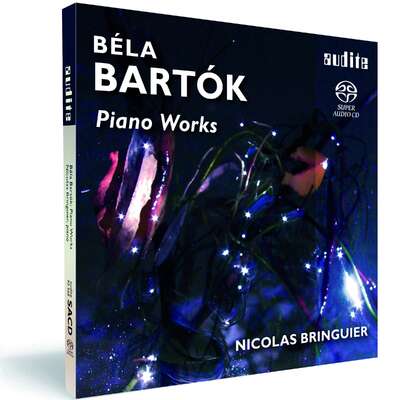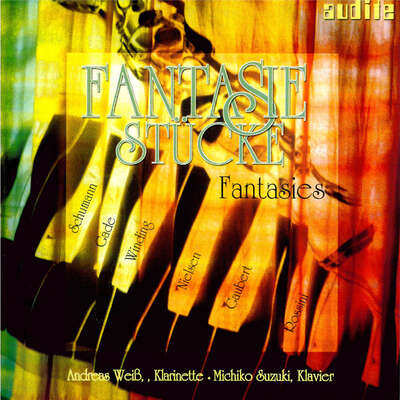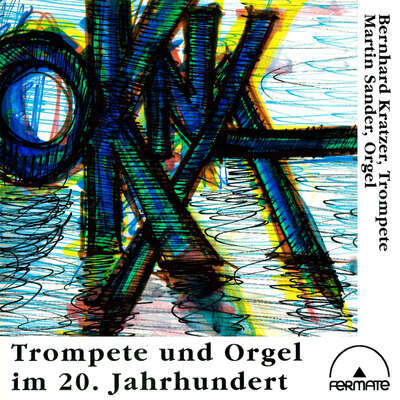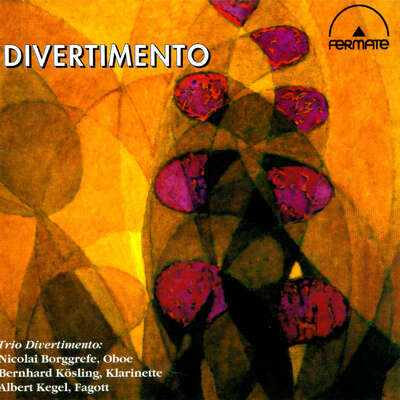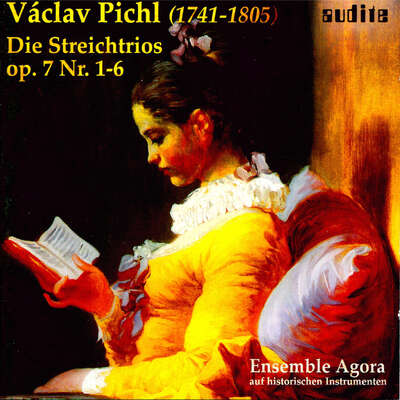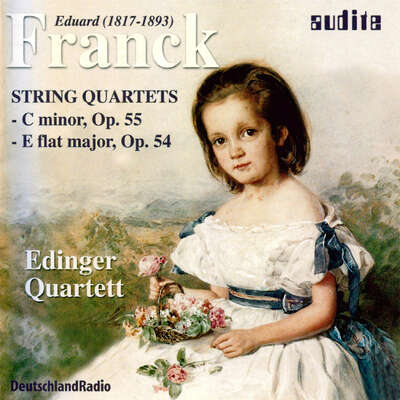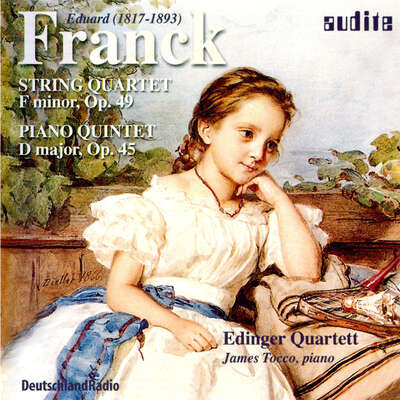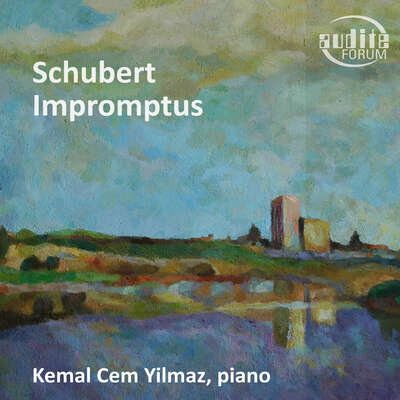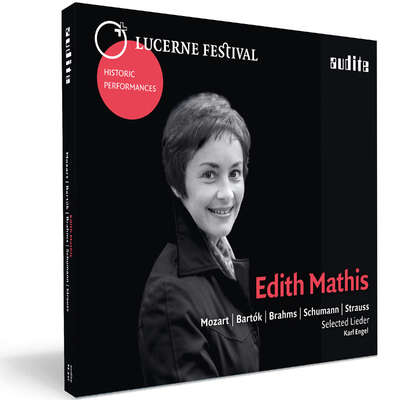
It is not a well-known fact that the Amadeus Quartet also championed the music of their contemporaries. For the radio, they recorded string quartets written by the major English composers of their time, Benjamin Britten and Michael Tippett. The Hungarian composer Mátyás Seiber introduced the Amadeus Quartet to the works of his fellow countryman Béla Bartók. By recording Henry Purcell’s string fantasias, they followed references between Britten and the cradle of English chamber music.more
It is not a well-known fact that the Amadeus Quartet also championed the music of their contemporaries. For the radio, they recorded string quartets written by the major English composers of their time, Benjamin Britten and Michael Tippett. The Hungarian composer Mátyás Seiber introduced the Amadeus Quartet to the works of his fellow countryman Béla Bartók. By recording Henry Purcell’s string fantasias, they followed references between Britten and the cradle of English chamber music.
Track List
Details
|
The RIAS Amadeus Quartet Recordings - Modernism
The RIAS Amadeus Quartet Recordings, Vol. IV |
|
| article number: | 21.429 |
|---|---|
| EAN barcode: | 4022143214294 |
| price group: | BCA |
| release date: | 10. April 2015 |
| total time: | 138 min. |
Bonus Material
Informationen
Volume IV in the series The RIAS Amadeus Quartet Recordings presents the ensemble with twentieth century Hungarian and English works. The Baroque composer Henry Purcell is also represented - as a reference point for Benjamin Britten's Second String Quartet. This edition substantially broadens the view of the Amadeus Quartet and demonstrates the inquisitiveness and assuredness with which Norbert Brainin and his three colleagues explored the music of their contemporaries. Prompts to follow this path came from fellow musicians and colleagues at London's Morley College. Under the direction of Michael Tippett, a group of young composers, including Mátyás Seiber and Peter Racine Fricker, wrote their new string quartets for the Amadeus Quartet. Apart from Michael Tippett, it was first and foremost Benjamin Britten who, around 1950, established his reputation as Britain's most renowned composer. His Second String Quartet was conceived as a reminiscence of Henry Purcell, a progenitor of English music, for the 250th anniversary of his death. Two of Purcell's string fantasias and a chaconne, on which Britten had based his work, have therefore been included in this edition. They are released for the first time in the Amadeus Quartet's interpretation. The Hungarian composer Mátyás Seiber - who, like the members of the Amadeus Quartet, had to emigrate to Britain after the Nazis had seized power in Germany - wrote his Quartetto lirico in the spirit of the Viennese School, particularly that of Alban Berg. He also championed the string quartets of his fellow countryman Béla Bartók, whose Fourth and Sixth Quartets are also available for the first time as performances by the Amadeus Quartet. The audite series The RIAS Amadeus Quartet Recordings, scheduled to include six volumes, exclusively presents performances released for the first time on CD.
Reviews
www.new-classics.co.uk | 04.10.2016 | October 4, 2016 | source: http://www.new-c...
Celebrated for their performances of the Viennese Classics, the Amadeus Quartet dominated the British chamber music scene for over 40 years and wasMehr lesen
BBC Music Magazine | July 2016 | Julian Haylock | July 1, 2016
Captured variously between 1950 and 1956, the Amadeus compensate for the occasional rough edge with gripping musical intensity in Britten's andMehr lesen
www.concertonet.com | 04/15/2016 | CL | April 15, 2016 Le «modernisme» du Quatuor Amadeus
Techniquement à l’aise, ils sondent les profondeurs et libèrent avec une force contenue les regrets, les ironies, les détresses, les fulgurances et les rages. L’ensemble bénéficie d’une prise de son claire, d’une belle présence lumineuse. Vivement recommandé.Mehr lesen
Musica | N° 270 ottobre 2015 | Stefano Pagliantini | October 1, 2015
[...] anche qui l’adesione al verbo della modernità è così intimamente vera e sentita da porre queste esecuzioni come un unicum tra le interpretazioni dei lavori bartókiani. A confermare l’eccellenza della realizzazione la qualità generalmente alta della registrazione e la cura delle note che accompagnano i due CD.Mehr lesen
Kulimu | 41. Jg. 2015 Heft 1/2 | bs | October 1, 2015
Intensive Spannungen gehen einher mit exquisiter Homogenität. Nie die große Phrase aus den Augen verlierend, wird das Vorwärtsdrängen der Musik und die dynamisch feurige Dramatik in ihren Interpretationen besonders spürbar. [...] Die Wiederbelebung dieser alten Aufnahmen, die in Zusammenarbeit mit dem Deutschlandradio Kultur entstanden, sind ein absolutes Muss für jeden Musikliebhaber und jede Plattensammlung. Mehr lesen
Crescendo Magazine | Le 21 septembre 2015 | Bernard Postiau | September 21, 2015 Une facette méconnue du Quatuor Amadeus
En résumé, un complément indispensable à la connaissance de cet ensemble majeur dans l’interprétation du quatuor à cordes au 20ème siècle.Mehr lesen
www.concertonet.com | 09/15/2015 | Gilles d’Heyres | September 15, 2015
Audite a déniché une perle en même temps qu’un inédit dans la discographie du pianiste américain, emporté trop jeune par la leucémie. Le geste est foudroyant, la technique monumentale, l’inspiration riche en trouvailles. Une version très personnelle [...] ce portrait d’un génie du clavier, foudroyé en plein vol.Mehr lesen
www.artalinna.com | 16 août 2015 | Jean-Charles Hoffelé | August 16, 2015 Les modernistes
[...] ouvre une porte inconnue dans l’histoire d’une formation légendaire.Mehr lesen
www.classical.net | 11.08.2015 | José Luis Bermúdez | August 11, 2015
This set is the fourth in a six volume series with 25 CDs in total. The recordings all come from studio performances recorded in the post-war period by the RIAS radio station. RIAS stands for Rundfunk im amerikanischen Sektor (Broadcasting in the American Sector). The engineers at Audite have remastered the original studio tapes to produce first-rate sound quality. The Tippett recording is slightly worse quality than the others, but still perfectly acceptable. And, as is typical for Audite, the liner notes (by Rüdiger Albrecht) are detailed and informative. This is an exceptionally well-produced set, highly recommended for historical and musical value. Mehr lesen
Record Geijutsu | 08/2015 | August 1, 2015
Japanische Rezension siehe PDF!Mehr lesen
Gramophone | July 2015 | Rob Cowan | July 1, 2015 Amadeus disc premieres
One of my fondest concert memories from the late 1960s is of hearing the Amadeus Quartet in recital at a north London school playing Bartok's FourthMehr lesen
The second CD opens with Matyas Seiber's Third Quartet, Quartetto lirico, which is noticeably influenced by Bartok, the Sixth Quartet especially, and the Amadeus play it marvellously well. The opening minute or so of Bartok's Fourth sounds a little uncertain: the pizzicato Scherzo is rather measured and the wildcat finale lacks the sort of animal vigour that the Juilliards, the Veghs and indeed the Fine Arts brought to It. The performance's highlight is Martin Lovett's passionately rhapsodic cello solo in the slow third movement. The Sixth's first movement is at times rhythmically ambiguous, as if the players were just a few short steps short of mastering its form, whereas they're nearer the target in the dry, even OTT humour that fills the two middle movements. Best by far is the closing Mesto, music filled with profound sadness, a sadness that the quartet members, or the three of them who had been exiled from Europe, will have felt as deeply as the composer himself. Ironically it's the all-British first disc that finds them truly in their element, the Second Quartets of Britten and Tippett, music they seem to connect with intuitively. Both performances are memorably expressive.
www.pizzicato.lu | 09/06/2015 | Guy Engels | June 9, 2015 Ausnahmekönner
Nach der Aufarbeitung der Wiener Klassik (Mozart, Beethoven und Schubert) widmet sich die jüngste Veröffentlichung historischer Aufnahmen desMehr lesen
CD 2 beinhaltet das ‘Quartetto lirico’ von Matyas Seiber und die Quartett 4 und 6 von Bela Bartok. Wir befinden uns in Zeiten des Umbruchs nach zwei Weltkriegen, die die Menschheit komplett aus dem Gleichgewicht geworfen und die Suche nach neuen kulturellen Referenzen und Orientierungen unabdingbar gemacht hat.
Sämtliche eingespielten Kompositionen sind Zeugnisse dieser Suche, die dennoch nie ganz ohne Referenzen an die klassisch-romantische Tradition – bei Britten sogar an die Barockzeit – auskommt.
Das ‘Amadeus Quartett’ deutet diese Nachklänge zerbrochener Welten mit fesselnder musikalischer Tiefe – manchmal scharfzüngig, vorwiegend jedoch zart, mit fiebriger Intensität (z.B. das wunderbare Cello-Solo im 4. Bartok-Quartett). Zieht man zudem die Aufnahmebedingungen in Betracht – ein quasi Live-Mitschnitt ohne die Möglichkeit kosmetischer Nachbesserungen – liefern diese hervorragend überarbeiteten Studio-Aufnahmen aus den 50er Jahren einen weiteren Beweis der Ausnahmestellung des Amadeus Quartett.
Gripping performances of unusual musical insight and depth.
Audiophile Audition | May 29, 2015 | Gary Lemco | May 29, 2015
The performance [...] has been conscientious, intense, and sonorously engaging.Mehr lesen
WDR 3 | TonArt 22.05.2015, 15.05 - 17.45 Uhr | Wibke Gerking | May 22, 2015
Das faszinierende an der Aufnahme ist, dass uns das Amadeus-Quartett hier einmal nicht als Anwälte von Mozart und Beethoven begegnet, sondern als Zeugen ihrer eigenen Zeit. Sie spielen das, was gerade angesagt war um sie herum, im London der 50er JahreMehr lesen
Die Presse | 02.04.2015 | Wilhelm Sinkovicz | April 2, 2015
Amadeus Quartett: „Modernism“
Eine Offenbarung: So musikantisch kann man Werke von Britten und Tippet spielen!
Eine Offenbarung: So musikantisch kann man diese Werke bei aller analytischen Durchdringung spielen!Mehr lesen
